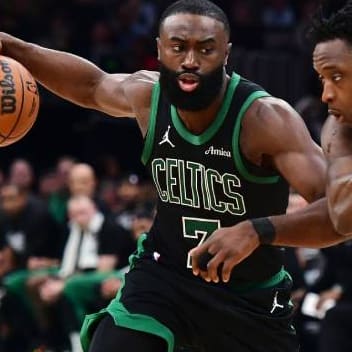End hero ball now.
And then forget it ever existed.
The flawed concept of "your best player must single-handedly win the game in the closing minutes" has infected the NBA and now the contagion is spreading into college.
In recent college seasons, we've had great scorers try to win games at the end all alone. Jimmer Fredette was no stranger to this at BYU. Even a worshipped player like Gerry McNamara would become a black hole when his team needed a victory.
But the concept of hero ball stopped there. It was reserved for guys who were the score-first players, the ones who always wanted to be in a position to put the ball in the hoop regardless of the score and the time left on the clock. That desire just happened to jump up a bit more in clutch situations.
But a "pass-first", college point guard regressing to chucking in the game's most important moments? We wouldn't see that, right?
Wrong.
Hero ball, it's ruining everything.
Let's take a look at two of the best, most prolific, past-first point guards in the NCAA, two kids who fell victim to hero ball over the weekend: Syracuse's Michael Carter-Williams and Missouri's Phil Pressey.
Prior to the weekend, no one would ever accuse Carter-Williams of selfishness, but in Saturday's loss to Temple, it was clear he felt the burden on his shoulders.
Undefeated Syracuse maintained a 40-38 halftime lead over Temple, a team that had just come off a loss to a hardly threatening Canisius. But once Temple scored the first four points of the second half to take a two-point advantage, it became the MCW show, but hardly in the way coach Jim Boeheim would have wanted it.
The following eight Syracuse possessions either ended with a Carter-Williams shot (and no passes) or had only one pass and then a shot. Everything ran through the sophomore point guard and in an offense that doesn't employ many designed plays, it was hard to get him out of that mentality.
Syracuse never regained the lead and Carter-Williams, who is hardly a shooter and is trying to become the first collegiate player to average more than 10 assists per game since Avery Johnson in 1987-88, finished with 14 missed field goals – including an 0-for-5 effort from long range.
Carter-Williams isn't a major scorer and he's certainly not a knock-down shooter. Think Shaun Livingston pre-knee injury and you've got it, a long 6-foot-6 point guard with x-ray vision when he chooses to use it.
But sometimes he doesn't choose to. And that's a problem. Even the "pass-first" point guards aren't facilitating anymore.
For further evidence of that, see: Phil Pressey, the type of player that makes you giddy with every defense-shredding pass he completes.
Pressey, who dished and dimed last year as well as any other point guard in the country, entered this year a season removed from breaking Mizzou's all-time assist record. Listed at 5-foot-11 (there's absolutely no chance he's taller than 5-foot-9), Pressey made a living last year either running the pick-and-roll with Ricardo Ratliffe, one of the best roll men in the country, and slashing into the lane and kicking out to elite spot-up shooters like Kim English and Marcus Denmon.
But all those guys – English, Denmon, Ratliffe – are now graduated and Pressey feels the need to create on his own without the volume of spot-up shooters he had last season.
Heading into the Braggin' Rights Game against No. 10 Illinois on Saturday, Pressey hadn't been shooting the ball well of late. That continued into the game, but he just kept shooting.
The brilliant passer, who is capable of making tosses like these, simply neglected to give the ball to his teammates at the right times.
It wasn't the Illini defense turning him into a scorer. He dribbled with his head down and failed to work with the precision we saw all of last year and at times this year.
Twice in the final few minutes of a close game, Pressey headed towards the rim and had Jabari Brown, his best spot-up shooter, open in the right corner. The first time, he recognized Brown late and got him the ball just in time for a defender to close out on a missed Brown three pointer. The second time, he overlooked Brown altogether, chucking up a poor floater.
In a way, it was a depressing Saturday for college basketball fans to see the two best pass-first point guards in the NCAA completely stray from their games. As an NBA fan, I was distraught wondering if this is the future of the league. We should be thanking guys like LeBron for not giving into the media pressures that claim, "If you're the best player on the team, you must take and make the last shot!" He's one of the few that is actually upholding the purity of the game.
Anti-hero ball sentiment should trickle down to the pass-first guys. Otherwise, we really shouldn't be calling them pass-first, should we? Neither Pressey nor Carter-Williams is a knockdown shooter and their desirable dishing is what gets them on SportsCenter so we label "pass-first".
But how can a Missouri point guard that has missed 14-plus shots in two of his past four games really be a pass-first guy? How can a Syracuse player that refused to allow his teammates to get into a rhythm against a lesser team have that label?
We love to credit assists. Pressey is averaging 6.3 per game while Carter-Williams boasts a nation-leading 10.3 per game. But those two players dominate the ball as much as any others in the country.
When Carter-Williams forces eight consecutive possessions of either his shot or a shot directly off one of his passes, of course he'll get assists. When Pressey dominates the ball for the vast majority of his team's possessions in a game in which he sat only one minute, clearly he's going to threaten double-double numbers. That's the way the game works. Statistics are situational. They need context.
Right now, the context is hero ball. And if we want our true pass-first point guards back, we need to bury that idea before it ruins the game as we know it.
Fred Katz is an NBA writer for RotoWire. Contact him on Twitter at @FredKatz.










































